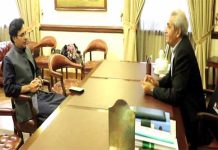RAWALPINDI: Director General (DG) of Inter Services Public Relations (ISPR) department of Pakistan
army Major General Asif Ghafoor has in an interview on Tuesday affirmed Pakistan’s efforts in establishing peace along the lines of Afghan Border.
While talking to an anchor of a private TV channel, Ghafoor said that Pakistan had been persistent in its contribution towards the Afghan Peace Process and will keep on doing so.
Upon being questioned about Pakistan army’s influence on the Taliban, Ghafoor responded that Pakistan
army didn’t have any influence or control over the Taliban nor could they influence
their decisions to initiate negotiations.
He laid emphasis on the role of the two stakeholders, United States (US) and Afghanistan, along with the need to understand the political atmosphere in Afghanistan. He added that the Taliban will have to be brought to the negotiation table with that environment.
He clarified and stressed o
n Pakistan’s role as a facilitator of peace talks rather than being the party to initiate the talks. Ghafoor said that Pakistan was not responsible for bringing the Taliban on terms of peace but will play its role as a responsible member of the international community.
Ghafoor informed that the previ
ous meeting of US Deputy Secretary Alice Wells with
army chief General Qamar Bajwa revolved around security matters and concerns of Pakistan and Afghanistan. He added that equating the border betwee
n Pakistan and Afghanistan with that of two districts of Malakand Division and Swat posed a great threat to Pakistan’s national security.
He added that as of today only six check posts exist in Swat when in 2016 they numbered 21. He said that these check posts have helped the
army foil 580 terrorist attempts last year and also are a source of gathering intelligence and information about the operating terrorists.
Ghafoor said that the situation of Swat had turned into Pakistan’s favour and it showed ‘our efforts in curbing terrorism and establishing peace in such areas’.
The ISPR DG upon being asked about Bajwa Doctrine and arrest of Khadim Hussain Rizvi, responded that the parliament and judiciary were supreme and disrespecting
their decisions should be out of the question.
He added that
army had no role to play either in politics or in the upcoming elections.
He condemned the Quetta attacks, targeting C
hristians, and said that Daesh had claimed responsibility but it didn’t have a proper structure i
n Pakistan so it joined hands with other terrorist outfits. He added that the forces were trying to curb terrorism by eliminating small terrorist outfits and had been successful in reducing the number of attacks in Balochistan.
